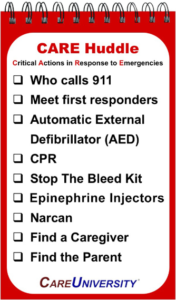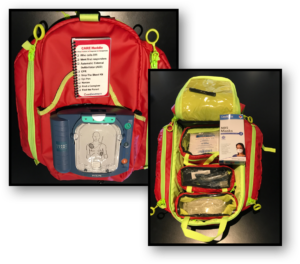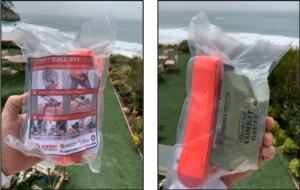
Our team is undertaking a number of Research and Development Projects in bystander care. We are focused in the areas of “the 4 P’s” – prevention, preparedness, protection, and performance improvement of harm from the high impact care hazards we are targeting. We are identifying innovations in leadership, practices, and technologies that can enhance the lifesaving impact bystander care can deliver. We have provided order lists and links to purchase Care Pack gear and Stop the Bleed Kits. We will continue to update them as products and the science evolves.

CARE Huddle Checklists
The CARE Huddle Checklist is being studied in healthcare organizations, schools, colleges, athletic teams, and with families.
Building on human factors engineering and the pioneering work of leaders in aviation, the use of checklists is vital prior to an emergency, during emergencies, and after an event to optimize the improvement of how we can do better the next time.
The checklist depicted here might be used for a school or sports team. We are also developing CARE Huddle Checklists for families to enhance emergency preparedness for such events as hurricanes, floods, fires, and vehicular accidents.
Educational modules that address the use and development of CARE Huddle Checklist tools are being developed along with free mobile applications that can be customized for an event including opportunities to import maps and AED locations.
CARE Pack
The lightweight back pack depicted here is a typical pack that might be used by a professional Emergency Medical Technician (EMT).
We are undertaking frontline R&D with schools, colleges, teams, and law enforcement professionals to determine the right combination of tools, devices, and consumables that will enable non-clinically trained bystanders to apply lifesaving skills when an emergency occurs.
CARE stands for Critical Actions Responding to Emergencies. This pack contains an the CARE Huddle Checklist, AED, Stop-the-Bleed kits including tourniquets, pressure badges, and instruments necessary for wound packing. It includes a first aid kit, flash light, and the safety equipment to protect the bystander caregiver including gloves and safety glasses. Epi Pen autoinjectors for anaphylaxis and Narcan kits for opioid overdoses are also made readily available in side zipper pouches.
We are developing Family CARE Pack prototypes and testing them with families involved with Boy Scouts who are pursuing their First Aid and Emergency Preparedness merit badges.

Care Pack Purchasing Supply List Thru www.walmart.com
- (x1) Eye Wash Solution
- (x5) 4×4 Non-Stick Gauze Pads
- (x5) 3” x 4-yard Sterile Gauze Roll
- (x1) Emesis Bags
- (x1) Roll of Medi-Rip Wrap
- (x2) Roll of Athletic Tape Wrap
- (x2) Nose Clips
- (x1) Instant Cold Pack
- (x1) Nitrile Gloves
- (x1) Antiseptic Wipes
- (x1) First Aid Kit
- (x1) Alcohol Gel Hand Sanitizer
- (x1) Penlight
- (x1) Tweezers (Point and Slant)
- (x1) Safety Vest
- (x1) N-95 Flat Fold Masks
- (x1) CPR Face Shield
- (x1) CPR Mask In Carrying Case
- (x2) Safety Glasses
- (x4) Tourniquets
- (x1) Sharpie Marker
- (x2) Hemostatic Gauze
- (x1) Silk Tape Rolls
- (x1) Trauma Shears
- (x1) Tool Lanyard
- (x1) Automated External Defibrillator
- (x1) Infant/Child Electrodes
Care Pack Purchasing Supply List Unavailable @ Walmart

Stop the Bleed Kits:
You may order kits from www.bleedingcontrol.org, however they provide only one tourniquet in every kit. The Stop the Bleed program teaches us to use a second tourniquet we build our own with Personal Protective Equipment as well. The contents of the kits and links for procurement are listed below:
You may use our account with North American Rescue:
Please contact supplies@med-tac.org for login access.

